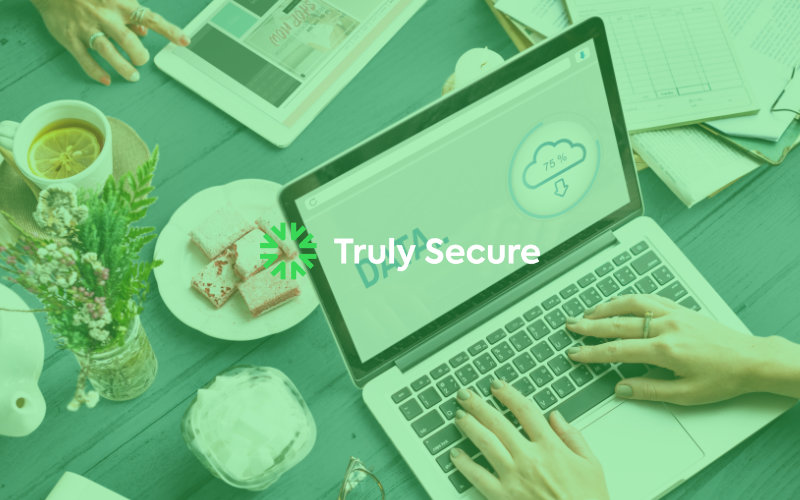Cloud data protection is one of the most important considerations for any business transitioning into the new age of unified communications. As the digital world continues to evolve and old-fashioned communication systems (like the PSTN network) disappear, investments in the cloud are growing.
The UCaaS market is expected to reach $118.8 billion by 2031 as companies embrace cloud solutions and software-as-a-service technologies for agility and business continuity.
However, while migrating your communications systems to the cloud can deliver many benefits, it’s not without risks. More applications and processes in the cloud mean more data for companies to protect. Failure to implement the right cloud data protection program puts companies at risk of significant reputational damage, massive fines, and security issues.
So, how do companies leverage the right data protection strategy in the cloud communications space? Here’s everything you need to know as you plan the next stage in your UC journey.
Why Companies Need Cloud Data Protection
Companies in today’s digital world are regularly producing, gathering, and storing large volumes of sensitive data. UCaaS platforms and CCaaS and CPaaS solutions are home to vast amounts of valuable information, from trade secrets to customer details.
As the shift to cloud-based processes continues, more companies are hosting and managing most of their data within the cloud ecosystem. Call recordings are stored in hybrid, cloud, and SaaS solutions. Messaging and meeting data sit in platforms like Microsoft Teams and Zoom. Companies are even creating huge file libraries to empower and educate hybrid workers.
Unfortunately, these growing cloud environments introduce a variety of security difficulties. When operating in the cloud, businesses face challenges with:
- Lack of visibility into where applications and their data are stored
- Third-party hosting limitations on data access and sharing
- Inconsistent security policies and data management standards
- Increasingly complex multi-channel data compliance regulations
Without the right cloud data protection plan, companies risk non-compliance with regulatory guidelines and the loss or theft of essential information.
The Challenges of Data Protection in the Cloud
The rising popularity of cloud communications and UC systems has prompted an increase in vendors implementing stronger security standards in their tools. However, companies still face several challenges with cloud data protection, particularly during the initial migration process.
Systems must be designed with secure access controls to ensure the wrong people can’t leverage specific tools and resources. Companies in highly regulated industries must consider data sovereignty and provide information collected and stored in suitable environments.
Additionally, new policies need to be implemented for sharing and managing data, focusing on improving visibility into data for crucial use cases while preserving compliance standards. Unfortunately, different cloud vendors’ security policies and solutions can vary.
This places companies under increased pressure to audit, evaluate, and optimize their communications strategy according to their specific needs. The right cloud data protection strategy will often vary for each business based on its regulatory environment, risk landscape, and communication tools.
At the same time, cybersecurity threats are growing as criminals continue to target the data available on UC and contact center platforms. As threats become more sophisticated, companies must invest in ever-more intelligent and intuitive tools to detect, reduce, and mitigate breaches.
The Benefits of Investing in UC Cloud Data Protection
While building and implementing the right cloud data protection strategy for your unified communications ecosystem can be complex, it does pay dividends. Security is now the top concern of many companies leveraging UCaaS systems and collaboration tools for multi-channel data sharing.
Perhaps more than anything else, a good plan for UC cloud data protection provides companies with the peace of mind they need to defend their most valuable assets. However, a stronger security strategy for cloud data can also offer:
- Greater visibility: Strong methods for cloud data security allow companies to maintain visibility into essential data. They also highlight the workings of the cloud landscape and which team members access resources.
- Better business continuity: Cloud data security tools and solutions often have features to automate and standardize backups. This frees teams from manual backup and recovery processes and allows companies to restore data in minutes.
- Enhanced compliance: While compliance regulations vary from one industry to the next, most require a focus on solid data protection. A cloud data protection program can help businesses to reduce their risk of non-compliance with regulations.
- Reduced costs: A strong strategy for cloud data security can reduce the total cost of ownership of a cloud platform. It helps minimize administrative and maintenance expenses. Some providers even offer automation tools to streamline security workflows for teams.
- Advanced threat detection: The latest tools for cloud data protection can help companies automatically scan for suspicious activity. This helps to accelerate responses to threats and reduce the impact attacks have on business operations.
UC Cloud Data Protection Best Practices
Ultimately, the right strategy for data protection in the cloud communications environment can vary for each company. Every business has its threat vectors and compliance guidelines to consider. However, many cloud vendors are implementing features that help companies protect essential data.
Here are some best practice tips to start you on your UC cloud data protection journey.
1. Evaluate the Security Features of your Platform
When choosing a cloud vendor for UCaaS, CPaaS, or CCaaS, it’s essential to assess the features they offer for improving data security. Many leading vendors offer service-level agreements to help ensure systems are adequately protected and adhere to leading compliance regulations.
They can offer access to tools for multi-factor authentication, end-to-end encryption, and data storage and management. Some solutions even provide access to applications and tools that allow companies to monitor conversations and data in real-time using artificial intelligence.
2. Prioritize End-to-end Encryption
Most cloud providers in the communications space now offer some form of encryption for the vast amounts of data that move through their platforms. Ideally, you should be looking for complete end-to-end encryption. This means ensuring all information in transit and at rest is protected across every communication channel.
Encryption ensures criminals won’t be able to access sensitive information, even if they break into your UC platform with fake credentials. Ensure everything from files to voice data is fully encrypted to protect your teams and customers.
3. Implement Strong Access Controls
Up to 88% of data breaches are caused by human error. This means ensuring good cloud data protection requires companies to invest in the proper access controls. Strict permissions and access controls provide only certain employees can leverage sensitive data anytime. This helps to improve the chain of custody surrounding data and minimize easy access to information.
Many cloud communications vendors offer access to various IAM controls, allowing companies to provide employees with different role-based access levels. You can also boost the protection of your system with things like multi-factor authentication.
4. Secure Endpoints and Hardware
Endpoints in the unified communication landscape can also be a source of risk. Smartphones connected to a business network can threaten businesses, particularly if teams log into platforms on insecure networks or download dangerous apps and files.
Implementing an endpoint protection solution can help to boost your cloud data protection strategy. They allow companies to monitor and restrict traffic on their network perimeter. Admins can also use these tools to patch, update, and wipe employee devices remotely.
5. Implement a Data Management Policy
Having a solid strategy in place for managing and storing data is crucial. Based on regulatory compliance guidelines, companies should have retention policies in place, as well as plans for data sovereignty.
It’s also important to consider how data will be removed or deleted from an ecosystem. Data management policies will cover everything from backup strategies for data retention to secure deletion processes.
Tips for Improving Cloud Data Protection in the UC Space
The ideal strategy for cloud data protection should be customized to suit the needs of each specific business. Some highly regulated companies even work with specialist security vendors to assess and audit their threat landscape and implement the right tools and zero-trust frameworks.
The best practices above will help ensure you’re building a robust data protection strategy. However, there are some additional tips you can keep in mind to boost your chances of success in the years to come.
Understand your cloud responsibilities.
Cloud communications vendors can offer features to improve your security standing. However, the safety of your data isn’t their full responsibility. Cloud providers and customers share the burden of cloud security. This means you must implement the proper measures to protect your business and leverage the right tools.
Though a company can offer tools to help boost compliance and privacy, it’s still up to you to implement the right policies, leverage access controls, and train your team on data protection.
Take a unified approach to security.
Unified communication platforms and similar omnichannel tools can help companies to improve their security strategies. These tools can bridge the gaps between various cloud-based resources, offering complete end-to-end visibility.
However, you must ensure you’re assessing your UC environment for any gaps. Ensure the APIs and integrations you use with your platforms follow the same security standards as the rest of your ecosystem. Implement end-to-end tools for monitoring security adherence and tracking potential risks. Ensure your IT admins can effectively see every possible threat.
Leverage the latest technology.
As cloud adoption accelerates, the risks in the UC environment are evolving too. There are even new threats emerging in the world of generative AI for businesses to be aware of. Leveraging more advanced technology can help companies to stay one step ahead of criminals.
Using AI to assess potential risks and non-compliance issues automatically can help you detect and respond to issues faster. Leveraging automation tools for backups, data loss prevention, and similar strategies can reduce the risk of data losses. Don’t be afraid to invest in the most advanced tools for proactively monitoring and protecting your cloud ecosystem.
Investing in Cloud Data Protection for Unified Comms
Cloud data protection is something no company can afford to overlook when moving into the new age of unified communications. The shift to the cloud presents an excellent opportunity for company-wide digital transformation. But like every significant change, moving to the cloud has its risks.
Ensuring you have the right strategy for cloud data protection in place will ensure you can defend your teams, customers, and essential assets. It also means you’ll be able to minimize your risk of non-compliance with necessary regulations and protect your business reputation.
Ensure you’re working with the right vendors in the communication landscape, leveraging the correct tools, and implementing the best policies to secure your data.
Source: Cloud Data Protection: Top Tips for Unified Communications – UC Today
Partner with Truly Secure for Reliable IT Support in Dubai
When it comes to securing your mobile and cloud-based solutions, partnering with a trusted IT support provider is crucial. That’s where Truly Secure comes in. With our expertise and experience in cybersecurity and IT support, we are the ideal partner to safeguard your digital assets and provide a seamless technology experience. If you are based in Dubai or across the UEA, contact us today to find out more!


